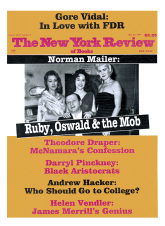In response to:
The Magic of W.B. Yeats from the April 21, 1994 issue
To the Editors:
I have just seen, belatedly, Denis Donoghue’s review [NYR, April 21, 1994] of my book Running to Paradise: Yeats’s Poetic Art. Professor Donoghue and I are colleagues of long acquaintance. I don’t doubt his good will and won’t labor the general differences we may have about poetry. But there are three points concerning the review I can’t well let pass. I’ll note them as briefly as possible.
The most basic point is that Mr. Donoghue overlooks the substance of the book. He doesn’t get around to noting that it has to do, in attentive detail, with the whole range of Yeats’s lyric poetry and poetic drama: their preoccupations, their unfolding and interactive qualities of form (especially the emotional dynamics involved), and the psychological pressures at work in them.
The second point has to do with the suggestion that I “dismiss” Yeats’s poem “Upon a House Shaken by the Land Agitation” because of its undemocratic stance. Well, I do mention that stance (about which Mr. Donoghue agrees with me), and I do suggest that the poem’s antiegalitarian passion is less moving than the hard-wrung triumph over self-pity in the equally undemocratic “No Second Troy.” But my discussion is anything but dismissive of the poem’s artistry. Anyone who reads it, as well as the other comments in Running to Paradise on politically resonant poems and plays, should see how unwarranted is the inference of such bias.
The third point is Mr. Donoghue’s trouble over my declared interest in the quality of Yeats’s art. “Quality,” he quirkily declares, is best “not defined or even talked about: let it emerge when the critic is thinking of something else, as in Rosenthal’s book when he’s reading ‘Demon and Beast’ and ‘The Tower’ and letting the pleasure of the reading animate his sentences.”
I’m grateful for this praise! My old friend seems to be casting a favorable vote after all, despite earlier dismissive—to borrow his term—comments. Nevertheless, I do wish he had let your readers know what Running to Paradise actually has to say about the body of Yeats’s writings over more than a half-century.
M.L. Rosenthal
Suffern, New York
Denis Donoghue replies:
I am grateful to M.L. Rosenthal for the cordial tone of his letter. We are old friends, and it shows.
On this occasion we agree-and-disagree. We agree on the distinctive scale and power of Yeats’s work. But Running to Paradise doesn’t deal, “in attentive detail, with the whole range of Yeats’s lyric poetry and poetic drama.” If it did, it would be an extraordinary achievement for a single book of criticism. Professor Rosenthal’s book is rich in “attentive detail,” but the claim to comprehensiveness is excessive.
We disagree, too, on the theory and practice of criticism. If he wishes to show that “No Second Troy” is a better poem than “Upon a House Shaken by the Land Agitation,” I am not persuaded by his telling me that the latter poem is “an incantation against elementary democratic reforms” and that the former poem enacts Yeats’s “hard-wrung triumph, over selfpity.” These are disparate considerations: the first is ideological, the second psychological or moral. I can’t agree that they come together in an analysis of Yeats’s language or that they work toward a critical discrimination of the poems.
Professor Rosenthal’s third point of disagreement turns upon the issue of poetic quality. He maintains that critics of Yeats have neglected this consideration. I don’t think they have. I could name many critics, starting with T.S. Eliot, I. A. Richards, F.R. Leavis, and Cleanth Brooks, who have taken up the question of quality in relation to Yeats’s poems. Much as I warm to the verve of Professor Rosenthal’s commentary on many poems, I don’t see that he has greatly clarified the question of quality or provided a vocabulary in which the question might, with a particular poem in view, be discussed. That was the point of my saying, in the review, that if Professor Rosenthal disagrees with another critic of Yeats—Leavis, for instance—on a question of critical evaluation or discrimination, his book “doesn’t indicate how the issue between them might even be joined.” Adjectives of praise or blame, even in the profusion of Running to Paradise, don’t add up to a poetics that might usefully be examined in its bearing upon the question of quality.
This Issue
May 11, 1995



